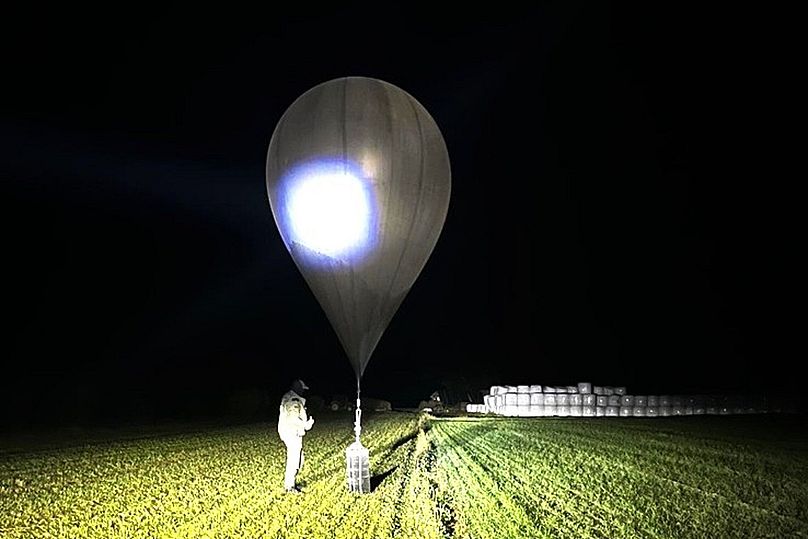In an exclusive interview with Euronews, the Belarusian opposition leader, living in exile in Lithuania, called the measure justified and urged Europe to stay united against provocations from both Minsk and Moscow.
Lithuanian authorities have extended the closure of border crossings with Belarus until the end of November in response to a series of airspace violations involving balloons used to smuggle cigarettes, a move that exiled Belarusian opposition leader Sviatlana Tsikhanouskaya says is justified.
"We fully understand why the borders are closed by Lithuania," Tsikhanouskaya told Euronews.
"All these attacks and interference into airspace have to have consequences for the Lukashenka regime. We see how the regime is provoking Lithuania's border through different means. It's a really hybrid attack: the migration crisis, drones over Poland, and now these balloons smuggling cigarettes."
The opposition figure living in Lithuania said her host country should continue protecting its citizens while also ensuring that ordinary Belarusians fleeing repression are not trapped inside their country.
"The only thing that we are asking is to let Belarusian people, law-abiding people, cross the borders," she said. "Sometimes it's the only way to escape prison in Belarus."
Lithuania announced the border closure earlier this week following what the authorities described as "constant violations" of its airspace.
The Lithuanian government said small hot air balloons carrying cartons of smuggled cigarettes entered Lithuanian skies multiple times this month, forcing airports to suspend operations.
Police have arrested several suspected smugglers and issued fines worth thousands of euros.
Vilnius has described the incidents as part of a broader "hybrid attack" orchestrated by Minsk, an assessment echoed by the European Union.
"These balloons are not merely smuggling tools, but occur in the context of a broader targeted hybrid campaign," said EU foreign policy chief Kaja Kallas, citing "state-sponsored migrant smuggling" as part of the same pattern.
European Commission President Ursula von der Leyen also denounced the incursions as "a hybrid threat," saying Europe "stands in full solidarity with Lithuania."
Lithuania's Foreign Minister Kęstutis Budrys told Euronews that defending Europe's eastern flank "is now an existential question" after a series of air incursions put member states from the Baltics to Poland on high alert.
Earlier this year, NATO launched Operation Eastern Sentry to bolster air defences in the region following multiple drone and aircraft intrusions.
On 9 September, Poland shot down Russian drones that had violated its airspace, the first time NATO forces had fired in self-defence since the start of Russia's full-scale invasion of Ukraine.
Belarusian leader Alexander Lukashenka has dismissed the Lithuanian measures as a "crazy scam," accusing the West of waging a "hybrid war" against Belarus and Russia.
But Lithuania and its allies argue that Minsk has been deliberately escalating tensions.
"The regime is always testing how far they can go in their provocations before consequences," Tsikhanouskaya warned.
Lukashenka is a key ally of Russian President Vladimir Putin and allowed him to use Belarus as a staging ground for the full-scale invasion of Ukraine in February 2022.
Tsikhanouskaya urged the European Union to remain "united and principled" in confronting both Minsk and Moscow.
"Europe has to respond with all the brutality they can — economic sanctions, political isolation, diplomatic efforts," she said. "The best and most effective tool to punish dictators is sanctions against the regime, not against people."
The opposition leader also argued that the border closures could indirectly pressure Lukashenka by limiting Belarus' role as a transit hub for Chinese goods.
"Many countries will not work with a regime that cannot provide this transition," she said.
For Tsikhanouskaya, the recent provocations are part of Lukashenka's efforts to test European resolve and seek legitimacy on the international stage.
"It's testing Europeans — how far they can go just to escalate," she said. "The regime is seeking legitimisation, seeking normalisation. But how is it possible to talk to dictators who keep their citizens in fear and want to spill this fear over other nations?"













